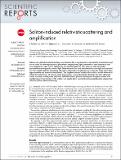Files in this item
Soliton-induced relativistic-scattering and amplification
Item metadata
| dc.contributor.author | Rubino, E. | |
| dc.contributor.author | Lotti, A. | |
| dc.contributor.author | Belgiorno, F. | |
| dc.contributor.author | Cacciatori, S. L. | |
| dc.contributor.author | Couairon, A. | |
| dc.contributor.author | Leonhardt, U. | |
| dc.contributor.author | Faccio, D. | |
| dc.date.accessioned | 2013-08-05T14:01:09Z | |
| dc.date.available | 2013-08-05T14:01:09Z | |
| dc.date.issued | 2012-12-06 | |
| dc.identifier | 62943757 | |
| dc.identifier | 4056a541-ed2b-493b-8a2c-a4df3935fb53 | |
| dc.identifier | 000311935700001 | |
| dc.identifier | 84871736080 | |
| dc.identifier.citation | Rubino , E , Lotti , A , Belgiorno , F , Cacciatori , S L , Couairon , A , Leonhardt , U & Faccio , D 2012 , ' Soliton-induced relativistic-scattering and amplification ' , Scientific Reports , vol. 2 , 932 . https://doi.org/10.1038/srep00932 | en |
| dc.identifier.issn | 2045-2322 | |
| dc.identifier.uri | https://hdl.handle.net/10023/3911 | |
| dc.description.abstract | Solitons are of fundamental importance in photonics due to applications in optical data transmission and also as a tool for investigating novel phenomena ranging from light generation at new frequencies and wave-trapping to rogue waves. Solitons are also moving scatterers: they generate refractive index perturbations moving at the speed of light. Here we found that such perturbations scatter light in an unusual way: they amplify light by the mixing of positive and negative frequencies, as we describe using a first Born approximation and numerical simulations. The simplest scenario in which these effects may be observed is within the initial stages of optical soliton propagation: a steep shock front develops that may efficiently scatter a second, weaker probe pulse into relatively intense positive and negative frequency modes with amplification at the expense of the soliton. Our results show a novel all-optical amplification scheme that relies on soliton induced scattering. | |
| dc.format.extent | 4 | |
| dc.format.extent | 858574 | |
| dc.language.iso | eng | |
| dc.relation.ispartof | Scientific Reports | en |
| dc.subject | Optical-fibres | en |
| dc.subject | Solitons | en |
| dc.subject | Non-linear optics | en |
| dc.subject | Ultrafast photonics | en |
| dc.subject | Supercontinuum generation | en |
| dc.subject | Q Science | en |
| dc.subject.lcc | Q | en |
| dc.title | Soliton-induced relativistic-scattering and amplification | en |
| dc.type | Journal article | en |
| dc.contributor.institution | University of St Andrews. School of Physics and Astronomy | en |
| dc.identifier.doi | 10.1038/srep00932 | |
| dc.description.status | Peer reviewed | en |
This item appears in the following Collection(s)
Items in the St Andrews Research Repository are protected by copyright, with all rights reserved, unless otherwise indicated.

